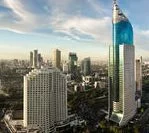IN less than three weeks’ time, Indonesians will be heading to the polls again for the first round of the presidential elections. That this singular event has grabbed all the headlines in Indonesia is hardly surprising, as it will undoubtedly be the most important event of the year.
For those of us based outside Indonesia, watching the election campaign has been an exciting affair, even more exciting than the World Cup for some. Yet it is important to note that despite the coverage given to the election campaign, Indonesian society also happens to be a complex one where there are a myriad of other events that are also worthy of reporting.
The problem is how one gets to know of these events and developments, and where we can get news about them.
For a start, it has to be noted that Indonesia’s media domain has expanded as never before since the advent of reformasiin 1998. Since then, Indonesia’s media domain has opened up as never before and this has manifested itself in the form of a wide range of new TV channels and local newspapers that offer a decidedly different perspective on things, both local and national.
As a researcher who travels and teaches in Indonesia regularly, and who has visited almost every part of that vast nation, I can say that what constitutes headline news differs from one region to another, and this reflects both the growing importance of local provincial power as well as local provincial identity-politics.
The accidental tourist who visits Indonesia may well find himself in Jakarta or Bali, but these metropolitan centres are not reflective of Indonesia as a whole.
Perhaps one of the most important developments in Indonesia today is the rise of local provincial newspapers that tell a different story. Many outsiders are familiar with Indonesia’s mainstream English papers, such as the Jakarta Post, a fine newspaper by any standard. We are also familiar with national papers, such as Kompas, Suara Medeka, etc.
But at the local provincial level, provincial papers are growing in importance and are anything but provincial. How many of us have even heard of papers such as Kaltim Post, Balikpapan Post, Makassar Tribune?
Yet these are the local papers that play an important role in the local political dynamics of places like East Kalimantan, South Sulawesi and the like. And they happen to have much more clout and influence at the local level as these are the papers that are read by ordinary local Indonesians themselves.
For local politicians who aspire to power in their respective provincial domains, these are the local papers to be seen in and to be reported in, for they are the real feelers and barometers of local opinion.
As someone who researches the internal institutional and structural development of Indonesian state and society, these papers are of great interest to me: A cursory reading of their contents will offer the interesting insight that for many local readers, local news is far more important than national news.
In many of these provincial papers, local news will make the front page and extend all the way to pages 2, 3, 4, up to 10 or so. Then comes national news, and only after that do we find some reporting (often scant, and often from syndicated sources) on the goings-on outside Indonesia.
What does this tell us? It tells us that for Indonesians living in the provinces outside Java, the capital is far away indeed and that the livelihood and wellbeing of people in provinces, such as West Papua, Sulawesi, Nusa Tenggara, etc., are linked to the local economies there.
One can aspire to a better life by rising up in one’s own provincial neighbourhood and the days when success was only to be found in the distant capital Jakarta seem to be over.
The development of Indonesia’s local provincial media is an indicator of sorts of how power, wealth and social capital are now being diffused and disseminated widely across the country, pointing to an Indonesia where local authority and credibility are more important than before.
In many ways, this is part of Indonesia’s own story of development, as it evolves towards some kind of poly-nuclear state where centralised rule is more and more a thing of the past.
Understanding the nature and depth of these changes, and recognising the driving forces behind them gives us a better understanding of where Indonesia is heading now into the future; and it allows me to reiterate the point that I have been making all along, namely, that Indonesia is a complex country that is becoming increasingly complex by the day.
Article by Dr Farish Noor which appeared in New Straits Times, 24 June 2014.





